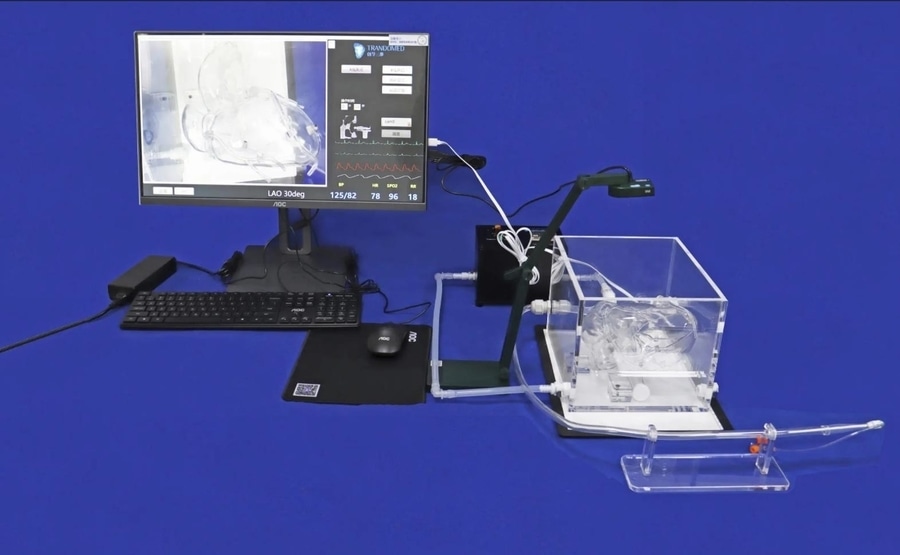
#Industry News
Advancing Interventional Cardiology
PCI Training Simulator
Interventional cardiology has revolutionized the treatment of cardiovascular diseases, providing minimally invasive procedures that effectively manage coronary artery blockages. Percutaneous Coronary Intervention (PCI), also known as coronary angioplasty, is a commonly performed procedure to restore blood flow in narrowed or blocked coronary arteries. In recent years, the use of PCI training simulators has emerged as an invaluable tool for medical professionals to enhance their skills, ensure patient safety, and advance the field of interventional cardiology. This article explores the significance of PCI and delves into the benefits of utilizing PCI training simulators in medical education and skill development.
Percutaneous Coronary Intervention (PCI)
PCI is a procedure performed by interventional cardiologists to treat coronary artery disease. It involves inserting a catheter into the blocked or narrowed coronary artery and inflating a small balloon to open the artery, followed by the placement of a stent to hold the artery open. PCI is used to relieve symptoms of angina, improve blood flow to the heart, and reduce the risk of heart attack. It has proven to be highly effective in improving patient outcomes and quality of life.
Importance of PCI Training
As with any medical procedure, proper training and proficiency are crucial for ensuring safe and successful outcomes for patients undergoing PCI. Competence in performing PCI requires a deep understanding of the anatomy, physiology, and technical aspects of the procedure. Training in PCI involves developing skills in catheter manipulation, wire handling, lesion identification, stent sizing, and deployment. Mastery of these skills requires extensive practice and hands-on experience.
Role of PCI Training Simulators
PCI training simulators provide a realistic and controlled environment for interventional cardiologists and trainees to practice and refine their procedural skills. These simulators replicate the anatomical features of coronary arteries, allowing users to gain hands-on experience in navigating through realistic vessel structures, performing catheter insertions, wire manipulations, and stent deployments.
Benefits of PCI Training Simulators
a. Skill Development: PCI simulators enable physicians to practice the procedural steps repeatedly, developing muscle memory and honing their technical skills. They can gain confidence in handling catheters, wires, and other interventional devices, leading to improved procedural efficiency and patient outcomes.
b. Procedural Planning and Decision-making: Simulators provide a platform for interventional cardiologists to plan and strategize their approach to different coronary artery lesions. They can practice lesion identification, assess vessel anatomy, and make informed decisions regarding the choice of equipment, techniques, and stent selection.
c. Risk-Free Environment: Training simulators create a safe and controlled environment for interventional cardiologists to practice without posing any risks to actual patients. This allows trainees to experiment, learn from mistakes, and refine their techniques without compromising patient safety.
d. Objective Performance Assessment: PCI training simulators often include performance metrics and feedback mechanisms that allow trainees to assess their procedural skills objectively. This objective assessment helps identify areas for improvement, track progress, and ensure competence before performing procedures on real patients.
e. Continuous Learning and Research: Simulators facilitate ongoing education and research in the field of interventional cardiology. Physicians can explore new techniques, test novel devices, and evaluate the impact of different approaches within the simulated environment. This encourages innovation and contributes to the advancement of PCI techniques and patient care.
Conclusion
PCI training simulators play a vital role in advancing the field of interventional cardiology by providing a safe and realistic platform for medical professionals to develop and refine their skills. These simulators enhance procedural competence, promote patient safety, and enable continuous learning and research in the evolving field of PCI. As the demand for high-quality cardiovascular care grows, leveraging PCI training simulators will continue to be instrumental in improving the skills and expertise of interventional cardiologists, ultimately benefiting patients worldwide.





